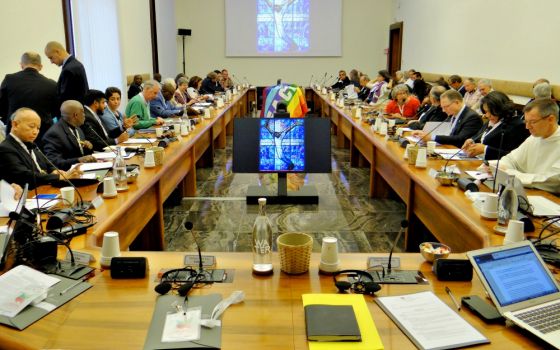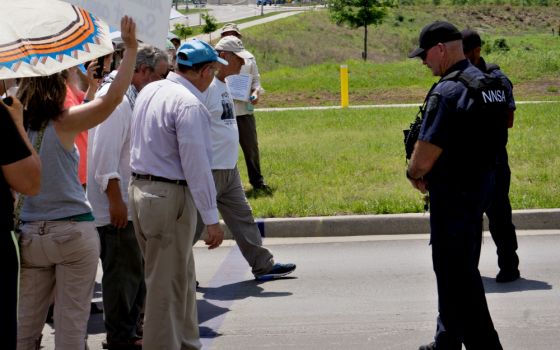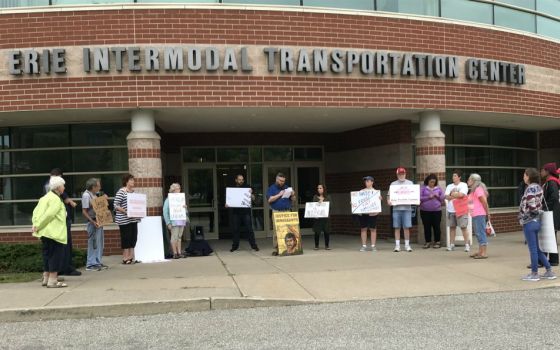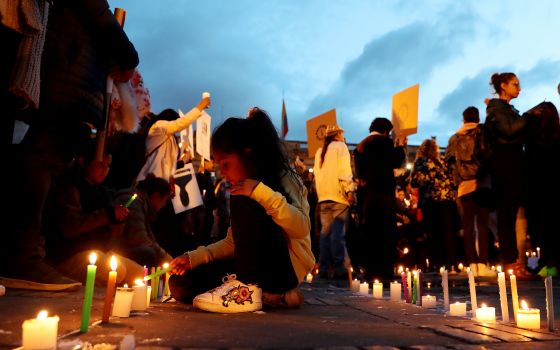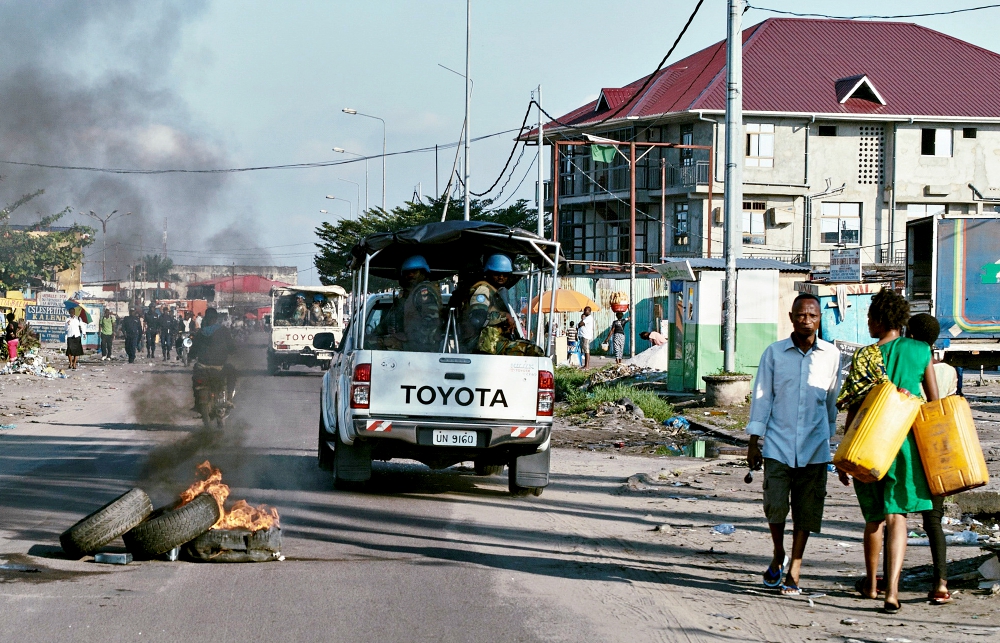
Peacekeepers drive past burning tires as they patrol protests against President Joseph Kabila in Kinshasa, Congo, April 10, 2017. (CNS/Reuters/Robert Carrubba)
When bishops from the troubled Democratic Republic of Congo recently urged their country's president to step down, it was only their latest vigorous intervention in what's widely considered Africa's most Catholic country.
For a whole year, Congo's bishops have sought to salvage a church-brokered peace accord between Joseph Kabila and his opponents. But African church leaders have been deeply involved in peacemaking elsewhere as well, from the Ivory Coast to Zimbabwe, in a mark of the practical engagement being fostered by Pope Francis.
"When feuding politicians are unable to arrange their own talks, they should be thankful for the benefits offered by Catholic mediators," Msgr. Léonard Santedi Kinkupu, rector of Kinshasa's Catholic University of the Congo and former bishops' conference secretary-general, explained to NCR. "The church has always used its moral authority for peace. It's a question of seizing the moment to perform a useful but temporary service, and then reasserting its distance from politics and leaving others to complete its work."
In a statement from their late November plenary, the bishops called on Kabila to release political detainees and allow opposition exiles to return.
But as "guarantor of the constitution," they added, he should also withdraw his candidature from coming elections, which were due in December 2017 but have now, to a chorus of protests, been postponed for a year.
Kabila seems unlikely to oblige.
The Catholic Church's six archdioceses and 41 dioceses account for around half the 77 million inhabitants of the French-speaking country, formerly Zaire, where up to 6 million died in a series of 1995-2003 wars, fought mainly over mineral riches.
In August 2016, the National Episcopal Conference of Congo launched a mediation bid after opposition leaders accused the president, already in office for 15 years, of seeking to cling to power after his second and final term expired. On Dec. 31, 2016, after much political brinkmanship, church negotiators patched together a deal, allowing Kabila to stay in office alongside an opposition-nominated head of government — but only till late 2017 elections. The much-vaunted "Saint-Sylvestre Accord" quickly ran into trouble.
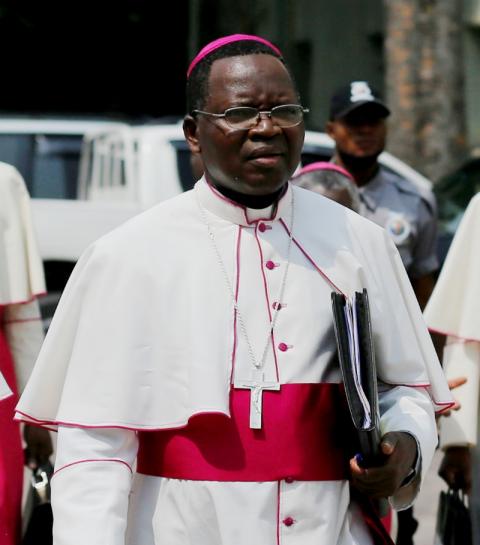
Archbishop Marcel Utembi Tapa arrives in December 2016 to mediate talks between the opposition and the government of President Joseph Kabila in Kinshasa, Congo. (CNS/Reuters/Thomas Mukoya)
Government and opposition representatives failed to agree on an election timetable or a share-out of ministries. By late March 2017, the bishops' conference president, Archbishop Marcel Utembi Tapa of Kisangani, had pulled out of implementation talks, accusing participants of ignoring "the welfare of the people."
In two detailed November 2017 statements, the bishops' conference criticized Congo's National Electoral Commission for backsliding and urged Kabila's government to work with United Nations' peacekeepers to ensure legal and procedural conditions for a vote.
It said Catholic Church observers had recorded 56 deaths and 355 arrests during opposition demonstrations between April and October 2017, as well as three fatalities in attacks on police. There had been "no significant improvement," they lamented, since the Saint-Sylvestre Accord.
"The political imbroglio and resulting suffering of the population is beyond any tolerable threshold," the conference said. "But this accord is not dead — it remains the only consensual road map for exiting this crisis, which has gone on too long. We are firmly resolved to accompany the Congolese people towards the fair, free and transparent elections which will allow our country to choose new rulers."
Even now, the prospects are unclear.
The church's persistence has sparked attacks on parishes around the country, as well as on Catholic schools, health centers and private homes.
Addressing local officials at Lubumbashi last summer, Kabila accused the bishops of "creating disorder" and "threatening" his government, while in November 2017, pro-government media charged Cardinal Laurent Monsengwo Pasinya of Kinshasa with staging an opposition "black mass" in the capital's Our Lady of the Congo Cathedral. Kabila's minister of communications, Lambert Mende, has accused the bishops of running a "discreditation policy," and rejected their recent statements.
When 14 Tanzanian troops from the United Nations' peacekeeping force were killed and some 50 wounded in an attack on Dec. 7, 2017, in eastern Nord-Kivu province, it highlighted the lawlessness now engulfing Congo. Yet the Catholic Church has been speaking out throughout Francophone Africa, which is home to some of the world's poorest populations.
Fasting, prayer, mediation
From Niger to Cameroon, Christians have been targeted by violent Islamist groups often linked to northern Nigeria's Boko Haram movement, which has killed tens of thousands and uprooted 2.3 million people since launching a scorched-earth insurgency in 2009. Nigerian church leaders date the Islamist insurgency to a 1989 "Abuja Declaration," issued by militant groups demanding the eradication of non-Muslim religions and the continent-wide imposition of Sharia, Islamic law.
But fear and instability have been fueled by other events too.
In Ivory Coast, where Catholics make up one-fifth of the 20 million-strong population, with Muslims making up around 35 percent, the bishops' conference took part in a Commission for Dialogue, Truth and Reconciliation, modeled on a similar body in South Africa. Earlier, the bishops had attempted to mediate in a brief but bloody 2010-11 civil war.
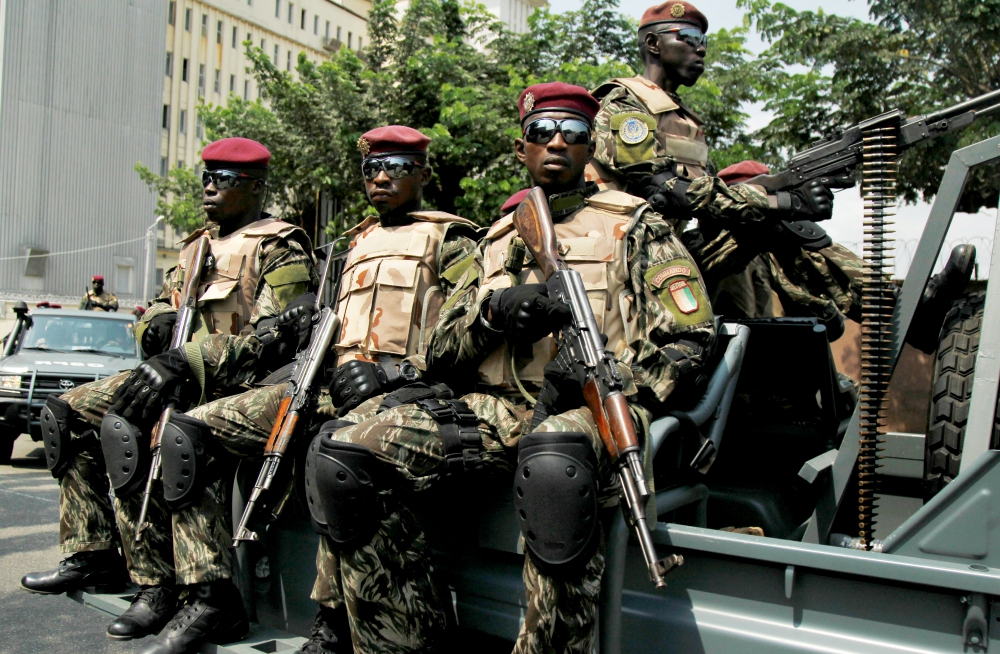
Members of the Ivory Coast presidential guard patrol as they arrive at the port of Abidjan. (CNS/Reuters/Luc Gnago)
Last January, they launched a campaign of "fasting and prayer for peace" after army mutinies and civil service strikes. They urged President Alassane Ouattara, who was installed with backing from the U.N. and France, to release detainees.
However, they also called on citizens not to "yield to the temptation of violence," and said the Catholic Church stood "ready to accompany a process of dialogue and reconciliation."
In Burkina Faso, where Catholics make up one-fifth of the population, church leaders under Cardinal Philippe Ouédraogo of Ouagadougou condemned an attempted 2015 coup by troops loyal to former President Blaise Compaoré, who'd fled abroad amid riots a year earlier after 25 years in power. The bishops backed reforms under the country's new president, Marc Christian Kaboré, and launched a training program for youth leaders and educators in "peace-building, nonviolence, citizenship and democracy."
Meanwhile, in mostly Muslim Mali, where French airstrikes pushed back ethnic Tuareg and Islamist insurgents in 2013, the small Catholic Church has backed a precarious 2015 peace deal with the government of President Ibrahim Boubacar Keïta, which will allow rebel fighters to be integrated into the national army.
As in Congo, Catholic churches and parish buildings have been ransacked and torched in Mali. Despite this, the country's newly elevated first cardinal, Jean Zerbo of Bamako, appealed for "peace, unity and reconciliation of hearts and minds" at a Mass before government officials last September, and asked local people to overcome "rancor, hatred and the urge for vengeance."
Farther south in Togo, church leaders have condemned police and army brutality against opponents of President Faure Gnassingbé, who took power in 2005 after 38 years' rule by his father. Gnassingbé announced plans last August to extend his mandate.
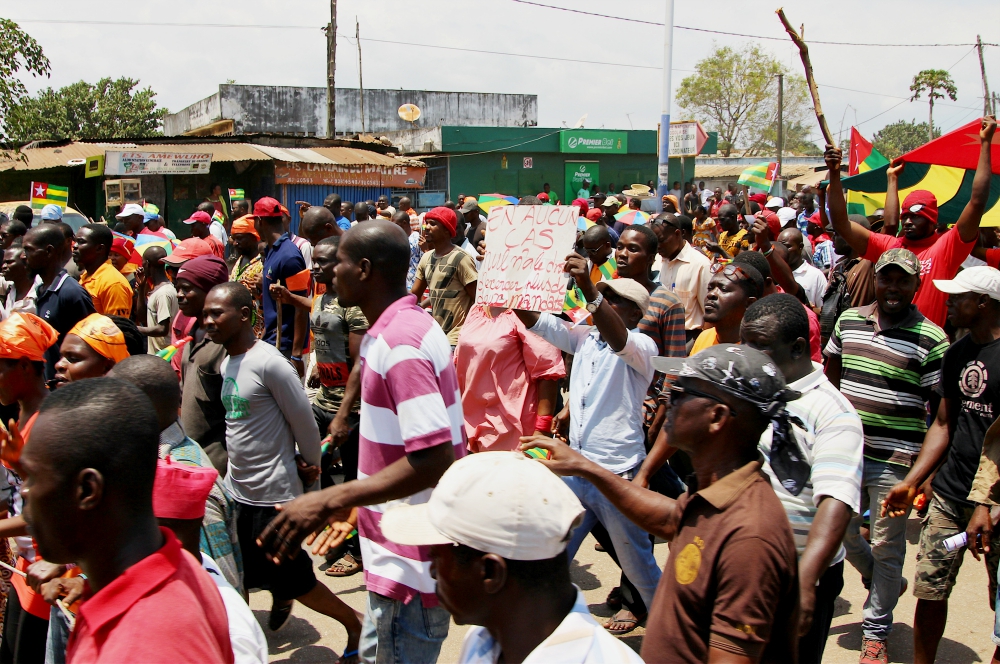
Opposition supporters take part during a protest Sept. 20, 2017, in Lomé, Togo, calling for the immediate resignation of Togolese President Faure Gnassingbé. (CNS/Reuters)
Archbishop Denis Amuzu-Dzakpah of Lomé has offered to mediate, while a bishops' conference declaration, read in churches in September, urged protesters to shun "hatred and violence," but also accused security forces of "dishonoring themselves" by resorting to "excessive force."
In tiny, landlocked Rwanda, where dozens of Catholic clergy, including Archbishop Vincent Nsengiyumva of Kigali, were murdered during a 1994 genocide, the church has been widely praised for contributing to national healing.
In neighboring Burundi, where conflict erupted in 2015 following President Pierre Nkurunziza's acceptance of a third term in violation of the constitution, the church has been similarly lauded for helping ease the economic and social effects of international sanctions and an aid boycott.
However, Burundi's bishops have also denounced killings and disappearances at the hands of pro-government paramilitaries. In March 2016, their appeal for dialogue was openly rejected by Burundi's ruling party, which insisted Nkurunziza's government would not talk to "sponsors of terrorism."
'Embrace peace'
To date, the Catholic Church's most publicized peace efforts have been in the Central African Republic, where Cardinal Dieudonné Nzapalainga is running an Interfaith Peace Platform with Muslim and Protestant leaders in a bid to halt violence between remnants of Seleka, a Muslim-dominated rebel movement that briefly seized power in 2013, and a mainly Christian militia, Anti-Balaka.
Catholics make up a third of the Central African Republic's 4.5 million inhabitants, and the church's nine dioceses have offered shelter and comfort to both Christians and Muslims.
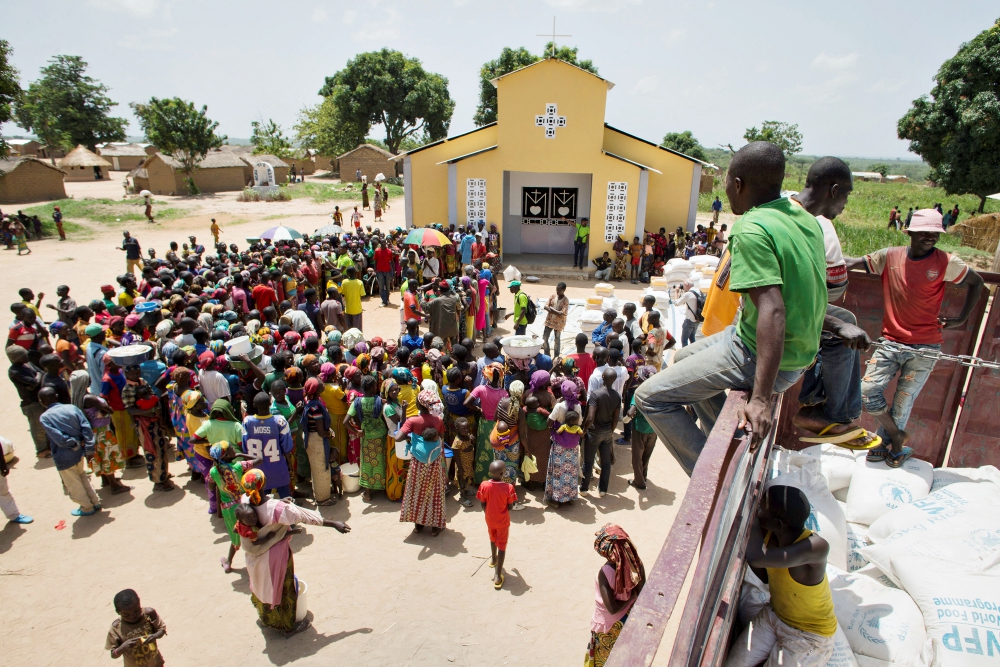
People wait in line for food distribution outside a church April 27, 2017, in Makunzi Wali, Central African Republic. (CNS/Reuters/Baz Ratner)
A 13,400-strong U.N. military mission, MINUSCA, was recently reinforced. However, Agence France-Presse reported in October that armed gangs still control 13 of the Central African Republic's 16 prefectures.
Here, too, Catholic parishes have paid a price — such as in the central town of Ippy, where Seleka rebels attacked a Catholic refugee center in mid-December. In an end-of-year interview with Centrafrique Espoir, Nzapalainga warned that forgiveness for crimes and atrocities would only be possible once justice had been done.
Bishop Nestor-Desiré Nongo-Aziagbia of Bossangoa, vice president of the Central African Republic bishops' conference, agrees firm action is urgently needed.
"Much of the peacekeeping contingent has lacked equipment and been hindered by bureaucracy, while armed groups have gone around our country, killing and maiming people," Nongo-Aziagbia told NCR. "In these circumstances, the church has an absolute responsibility to proclaim the Gospel daily and show concern for the people — caring for the afflicted, welcoming those in danger and speaking up for those whose rights are violated. But a good relationship with our Muslim neighbors is also essential for this — everyone shares this responsibility."
In Anglophone Africa, too, church leaders have long been involved in peacemaking.
Tanzania's Catholic bishops urged police and government to act more forcefully against Islamist intimidation after a Catholic church was bombed at Arusha in May 2013, the month a state of emergency was imposed against Boko Haram in Nigeria. They blamed the violence on outsiders, and insisted relations remained cordial between Tanzania's Christians and Muslims.
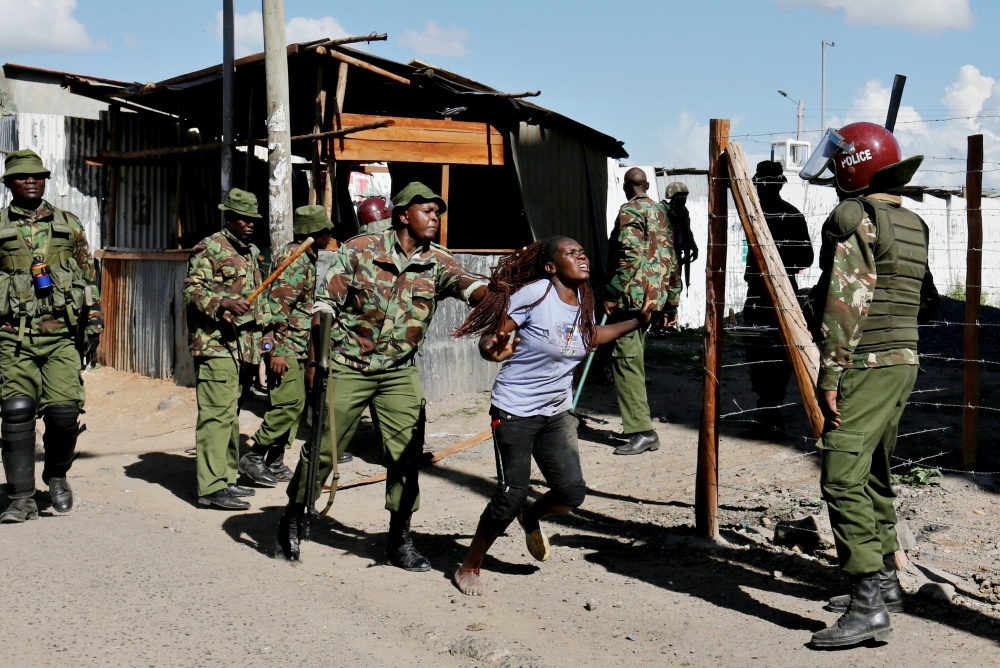
A police officer pushes a supporter of the Kenyan National Super Alliance during clashes Nov. 28, 2017, in Nairobi. (CNS/Reuters/Thomas Mukoya)
In Kenya, the bishops' conference urged citizens to "embrace peace" in a November 2017 pastoral letter during disputes over the re-election of President Uhuru Kenyatta, imploring young people not to be "manipulated by politicians into causing violence and destroying property."
The bishops also called on Kenya's political leaders to shun "divisive politics and reckless utterances" and work toward unifying the country.
Zimbabwe's bishops urged a peaceful solution following the forced November 2017 resignation of 93-year-old President Robert Mugabe; they condemned "sensationalism, false news and all forms of hate media" in an accompanying pastoral letter. Jesuit Fr. Fidelis Mukonori was said by Britain's BBC to have helped mediate between the Catholic Mugabe and Zimbabwe's military bosses.
Influence of Francis
Some observers think the growing peace efforts of African bishops' conferences owe much to Francis, who, as the first pope from the global south, appears intent on bolstering the church's international outreach.
The world's Catholic population has doubled in the last three decades to 1.3 billion, and is expanding by 12.5 million baptisms annually, and Vatican Radio broadcasts in 47 languages — many more than the BBC or Voice of America does.
The Holy See has a permanent presence in some 40 international organizations, such as the United Nations and its agencies, the Arab League, and the Organization of African Unity, while 193 countries enjoy diplomatic ties — a number that's also expanded.
Even in countries with only small Catholic minorities, the church wields considerable clout, as the world's largest nongovernmental provider of education and health care, and a significant aid donor.
Francis already took his message to the Central African Republic, Kenya and Uganda in November 2015. Although the Catholic Church can't end all conflict, it can certainly play a part in easing it.
Advertisement
The pope received the Democratic Republic of Congo's embattled Kabila at the Vatican in September 2016 and would have visited the country in summer 2017, had continued instability not prevented him. After a special prayer vigil on Nov. 23, 2017, the Vatican unveiled an aid package for Congo's troubled Kasai region, where a year of bitter fighting has left 1.4 million people displaced and 400,000 children facing malnutrition.
Kabila, who succeeded his assassinated father in 2001, is still in his prime and is unlikely to yield without a struggle.
Yet church leaders are unlikely to be deterred. In their November statement, they called on people to remain vigilant and protest peacefully if injustices occur.
Meanwhile, foreign governments have been in touch. In early December, a team from the Southern African Development Community held talks with Congo bishops' conference president Utembi. Pasinya will have briefed the pope at length on Africa during a Dec. 11-13 Vatican session of the Council of Cardinals, on which the Kinshasa archbishop represents the whole continent.
Catholic perspectives and experiences in this vast, conflict-torn country will certainly have resonated outward.
"It's sad that many people here no longer understand what's at stake for their present and future existence," Msgr. Jean-Marie Bomengola, spokesman for the Congo bishops' conference, explained in a December statement. "Our country needs enlightened citizens who'll seek out the common good, and this is what the bishops, against winds and tides, are doing as they preach justice and peace, and respect for the constitution and laws."
[Jonathan Luxmoore covers church news from Oxford and Warsaw. His two-volume study of communist-era martyrs, The God of the Gulag, is published by Gracewing in the U.K.]





